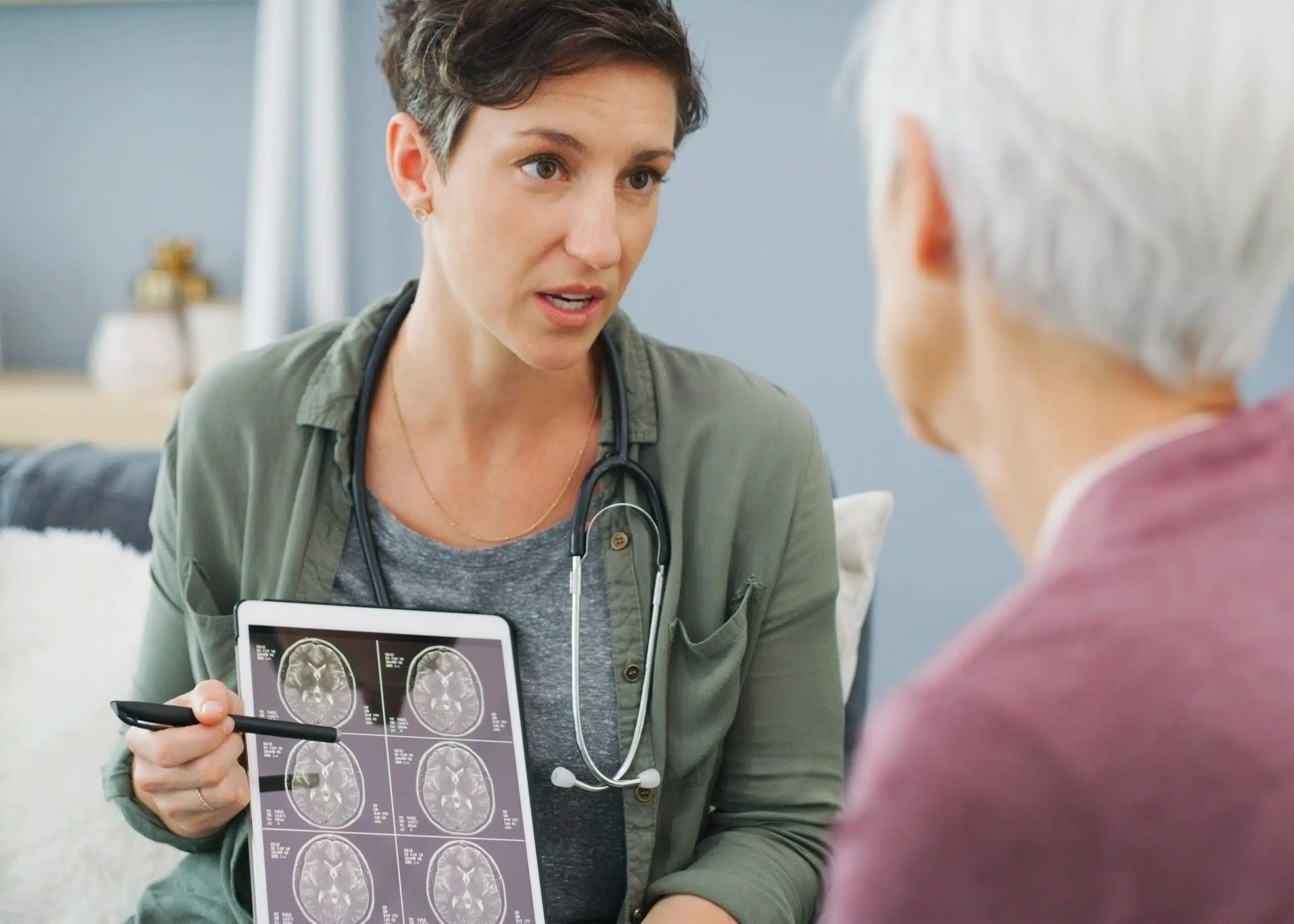Introduction
As we age, staying on top of our health becomes increasingly important. Did you know that 70% of people aged 50-64 have been diagnosed with at least one chronic condition? To help maintain a good quality of life and potentially avoid severe health issues, there are certain health check-ups for people over 50 that should be prioritized once you hit the big five-zero.
In this blog post, we will guide you through the top five essential health screenings for individuals over 50 to ensure you stay in tip-top shape.
Key Takeaways
- People over 50 should prioritize regular health check-ups to detect potential health issues early and prevent chronic diseases.
- The top five essential health screenings for people over 50 are colonoscopy, mammogram (for women), prostate cancer screening (for men), bone density test, and blood pressure check.
- Other important screenings include cholesterol and blood sugar checks, hepatitis C screening, pap smears (for women), and lung cancer screening (for smokers).
- Maintaining a healthy lifestyle through a balanced diet, regular exercise, adequate sleep, stress reduction, and vaccinations is also crucial for optimal health management in people over 50.
Importance Of Health Check-ups For People Over 50
Early detection of health issues and prevention of chronic diseases are critical reasons why regular health check-ups for people over 50 are essential.
Early Detection Of Health Issues
Early detection of health issues is crucial in maintaining optimal health for those over 50. By undergoing regular screenings and check-ups, individuals can identify potential problems before they progress into more severe conditions, allowing them to take necessary preventative measures.
About 70% of adults between the ages of 50 and 64 have at least one chronic condition – yet only one in four are up-to-date on their preventive checkups. By staying proactive with routine screenings like mammograms, colonoscopies, and bone density tests – which have been shown to significantly reduce the risk of advanced breast cancer by about 20% for women aged 50-69 – individuals can enjoy better overall health outcomes.
Additionally, new antiviral medications now enable more than 95% success rate when treating Hepatitis C if detected early through proper screening practices.
Prevention Of Chronic Diseases
Preventing chronic diseases is essential for people over 50, as this age group has a higher risk of developing conditions such as heart disease, type 2 diabetes, and certain types of cancer.
Regular health check-ups play a vital role in preventing these illnesses by detecting early warning signs and implementing appropriate preventive strategies before complications arise.
In addition to undergoing routine medical tests like cholesterol checks and blood pressure monitoring, maintaining a healthy lifestyle is crucial for preventing chronic diseases.
Simple yet effective habits such as regular exercise, following a balanced diet rich in fruits and vegetables, getting adequate sleep, reducing stress levels through mindfulness practices or hobbies, and staying up-to-date on vaccinations all contribute significantly to overall health management.
Improved Quality Of Life
Maintaining consistent health check-ups for people over 50 can significantly improve their overall quality of life. By detecting and treating potential health issues early, individuals can enjoy increased energy levels, a more active lifestyle, and engage in fulfilling activities with friends and family.
In addition to medical benefits, investing in regular health screenings also fosters mental well-being. Knowing one’s health status promotes peace of mind and encourages proactive self-care habits like eating right, exercising regularly, and reducing stress through mindfulness practices.
Furthermore, it helps individuals establish strong relationships with healthcare providers who can provide personalized guidance on maintaining optimal wellness throughout the years.
Top 5 Health Check-ups For People Over 50
Here are the five most important health screenings for people over 50: colonoscopy, mammogram (for women), prostate cancer screening (for men), bone density test, and blood pressure check.
Colonoscopy
Colonoscopy is a procedure that involves the use of a thin, flexible tube with a camera to examine the colon and rectum for signs of cancer, polyps or other abnormalities.
This health check-up is recommended for people over 50 as colorectal cancer is one of the most common cancers affecting men and women in the US. About 37 percent of adults over 50 have not had a colonoscopy.
It’s important to detect any issues early on since ulcerative colitis or Crohn’s disease may increase one’s risk for colorectal cancer.
Mammogram (for Women)
Women over 40 are recommended to have regular mammograms every two years as part of their health check-up routine. Mammograms use low-dose X-rays to detect any early signs of breast cancer that may not be noticeable during a physical exam.
According to research, mammograms can reduce the risk of advanced breast cancer by about 20% in women aged 50 to 69. It’s important for women to continue these screenings until at least age 74, with routine mammography being beneficial for those in their seventies as well.
Prostate Cancer Screening (for Men)
Prostate cancer is the second most common cancer among men, and it can often be asymptomatic until it has advanced. Therefore, screening for prostate cancer is an essential procedure that should be done regularly for men over 50.
The two recommended prostate cancer screening methods are blood tests for prostate-specific antigen (PSA) levels and digital rectal examination (DRE). While there’s been controversy in recent years about the effectiveness of PSA testing, many experts still recommend this as a valuable tool in early detection.
Bone Density Test
A bone density test is a non-invasive screening that measures the amount of calcium and other minerals in your bones. As mentioned, it is among the top recommended health check-ups for people over 50.
Women over 50, especially those with a family history of osteoporosis or fractures, should undergo this test regularly. The DEXA scan used during this test is quick and painless, usually taking 10-15 minutes to complete.
Your results will be compared to others in your age group and gender to determine if you have normal bone mass or are at risk for osteoporosis-related fractures.
It’s essential to note that many medications can also affect bone density, including some commonly prescribed drugs like steroids and anticonvulsants. Early detection and treatment of osteoporosis are crucial since half of postmenopausal women are at risk for related fractures.
With regular screenings using a bone density test after menopause when women lose estrogen protection from their bones, early detection leads to increased opportunities for prevention through lifestyle changes or medical interventions such as medication use or hormone replacement therapy (HRT).
Blood Pressure Check
Maintaining a healthy blood pressure is critical for adults aged 50 and over, as high blood pressure can lead to an increased risk of cardiovascular disease. This makes monitoring blood pressure a vital component of the top five health check-ups for people over 50.
Blood pressure screenings should be done at least once per year, and lifestyle modifications should be the first-line treatment for hypertension, according to the American College of Cardiology/American Heart Association.
These modifications include eating a balanced diet, exercising regularly, quitting smoking, limiting alcohol intake, managing stress levels, and maintaining a healthy weight.

Additional Important Health Check-ups
Other important health check-ups for people over 50 include cholesterol and blood sugar screenings, hepatitis C screening, pap smears (for women), lung cancer screening (for smokers), and bone density tests.
Cholesterol Check
Getting a cholesterol check is an important health screening for people over 50. Cholesterol levels can indicate the risk of developing heart disease, which is the leading cause of death in women.
Women with no known risk factors for coronary heart disease should have their cholesterol screened at age 45, while those with risk factors should get checked between ages 40 to 45.
High cholesterol levels can be improved through lifestyle changes such as eating a healthy diet, exercising regularly, quitting smoking and maintaining a healthy weight. In some cases, medication may also be prescribed to lower cholesterol levels if lifestyle changes aren’t enough.
Blood Sugar Screening
One of the top health check-ups for people over 50 is blood sugar screening. Diabetes can cause a range of problems, including damage to blood vessels and eyes, as well as cardiovascular issues.
A simple blood test can detect high levels of sugar in the bloodstream which are indicative of diabetes. Early detection can ensure effective treatment in the form of lifestyle changes such as increased exercise, dietary modifications, and medication if necessary.
Hepatitis C Screening
Hepatitis C is a liver infection caused by the Hepatitis C virus. It’s essential for people over 50 to be screened because it can take years or even decades for symptoms to appear; by that time, the liver damage may be irreversible.
In fact, Hepatitis C causes a significant number of deaths worldwide. Fortunately, antiviral medications have a high cure rate, and screening can lead to early detection, which means better outcomes.
The US Preventive Services Task Force recommends one-time screening for Hepatitis C for adults born between 1945-1965, as this group is five times more likely to carry the virus than other age groups.
Additional risk factors include engaging in risky behaviors such as IV drug use or receiving blood transfusions before widespread testing began in 1992.
Pap Smear (for Women)
Women between the ages of 21 to 65 should have regular Pap smear tests to detect cervical cancer or precancerous lesions. The test involves collecting cells from the cervix, which are then examined for any abnormalities.
Almost all cervical cancers are caused by high-risk types of human papillomavirus (HPV), and early detection is crucial in preventing its progression. Women ages 30 through 65 should be screened with either a Pap test every three years, the HPV test every five years, or both tests every five years. Regular cervical screening can help detect abnormal cells before they become cancerous and save lives.
Lung Cancer Screening (for Smokers)
Lung cancer is a leading cause of death for both men and women in the United States, with smoking being the biggest risk factor. As part of their health check-ups, smokers over 50 should consider getting screened for lung cancer using low-dose computed tomography (LDCT).
This type of screening can detect lung cancer early, when it’s more treatable and has a higher chance of cure. Studies have shown that regular screening reduces the risk of dying from lung cancer by up to 20%.
Tips For Staying Healthy Over 50
– Keep up with regular exercise to maintain muscle function, balance, and flexibility.
– Maintain a balanced diet rich in fruits, vegetables, whole grains, lean proteins, and healthy fats.
– Get enough sleep each night to support physical and mental health.
– Practice stress-reducing activities like meditation or yoga to improve emotional well-being.
– Stay up-to-date on vaccinations for the best protection against preventable diseases.
Regular Exercise
Regular exercise is vital for maintaining good health and preventing chronic conditions such as high blood pressure, high cholesterol, and diabetes in people over 50. Exercise can also improve bone density and reduce the risk of fractures.
Engaging in low-impact exercises like walking, cycling, swimming or even yoga has been shown to be physically and mentally beneficial. The Centers for Disease Control and Prevention (CDC) recommend that adults should engage in at least 150 minutes of moderate-intensity aerobic exercise per week, along with muscle-strengthening activities twice a week.
According to recent studies from Harvard Health Publishing report regular exercise combined with a healthy diet can prevent high cholesterol and reduce the risk of heart disease in people over 50.
Alongside this routine, exercising helps lower stress levels allowing one’s mind to recuperate, which results in better overall well-being mentally too, which can combat depression & anxiety issues as well.
Balanced Diet
Eating a balanced diet is one of the most crucial factors for staying healthy over 50. A balanced diet consists of all the necessary nutrients to maintain good health, including carbohydrates, proteins, fats, vitamins, and minerals.
It’s essential to consume whole foods such as fruits, vegetables, lean meats, nuts and seeds.
According to research by Everyday Health, maintaining a well-balanced diet can prevent chronic diseases such as diabetes or heart disease. Additionally it helps in maintaining gut health which becomes increasingly important with age.
Incorporating nutrient-dense foods like leafy greens and antioxidant-rich berries into daily meals can help keep cognitive function sharp while reducing inflammation throughout the body.
Eating healthy diets rich in fiber and antioxidants with low salt content can not only improve blood pressure levels but also help avoid weight gain, which has been linked with an increased risk for dementia later on in life (according to Alzheimer’s Association).
Getting Enough Sleep
Getting adequate sleep is vital for maintaining good health, especially for people over the age of 50. Lack of proper sleep can lead to a host of problems, including high blood pressure and diabetes, which are prevalent in older adults.
Studies show that getting enough sleep helps improve cognitive function, reduce stress levels, and boost immune function.
Establishing a regular bedtime routine can help facilitate better sleep patterns with age. This includes avoiding caffeine or alcohol consumption before bed and limiting exposure to electronic devices such as smartphones or computers late at night.
Additionally, exercising regularly during the day helps promote relaxation and improve overall sleep quality.
Reducing Stress
Reducing stress is crucial for people over 50 as it can have a significant impact on their overall health. Stress can lead to high blood pressure, heart disease, and other chronic illnesses.
Older adults should prioritize self-care activities such as regular exercise, getting enough sleep, and reducing screen time before bed to reduce stress.
They can also try relaxation techniques like yoga or meditation, which are known to calm the mind and promote relaxation.
Furthermore, regular health screenings help in the early detection of any abnormalities in the body that might cause stress later if not well managed. For instance, Depression screening is crucial for older adults since misdiagnosis or undertreatment of depression could contribute significantly to their overall quality of life, leading to anxiety and even suicidal thoughts if left untreated.
Staying Up-to-date On Vaccinations
Getting vaccinated is one of the most effective ways to protect yourself from diseases and illnesses that could otherwise be serious or even deadly. As you age, your immune system weakens, making it more important than ever to stay up-to-date on recommended vaccines for people over 50.
The flu shot is particularly crucial as older adults are at higher risk of complications from the virus. The CDC also recommends the shingles vaccine for those aged 50 and over, as well as vaccines for pneumonia, tetanus-diphtheria-pertussis (Tdap), and hepatitis B.
Conclusion
In conclusion, getting regular health check-ups is crucial for people over 50 to catch health issues early and maintain a high quality of life.
The top five health check-ups include colonoscopy, mammogram (for women), prostate cancer screening (for men), bone density test, and blood pressure check.
Additional important screenings such as cholesterol and blood sugar checks are also recommended for those aged 40-64. Staying healthy over 50 involves maintaining a balanced diet, regular exercise, getting enough sleep, reducing stress levels, and staying up-to-date on vaccinations.
FAQs:
1. What are the top 5 health check-ups recommended for people over 50?
The top 5 health check-ups recommended for people over 50 include annual physicals, blood pressure checks, cholesterol screenings, colorectal cancer screenings, and bone density scans.
2. Why is it important to get an annual physical after turning 50?
Annual physicals can help detect early signs of chronic diseases or illnesses that become more common as we age. This includes checking vital signs such as blood pressure and heart rate, conducting a comprehensive review of medical history, and overall evaluation of your physical condition.
3. Are there lifestyle changes I can make to improve my chances of choosing healthy aging?
Lifestyle changes such as quitting smoking and limiting alcohol intake are some ways you can improve your chances of healthy aging by reducing risk factors associated with several conditions like heart disease, diabetes, or high cholesterol levels.
4. What should I expect during a bone density scan?
A bone density scan measures the strength and quantity of calcium in bones, which helps determine risk factors for osteoporosis- a condition characterized by brittle bones prone to fracture. During this exam, you may be asked to lie down on a table while an imaging machine examines various areas within the body where fractures occur most frequently – usually hips & spine being tested first using low-level X-rays (less radiation than general x-ray machines). The test takes only minutes but could save someone from serious consequences if caught early on before they experience significant declines in bone mineral density levels.

